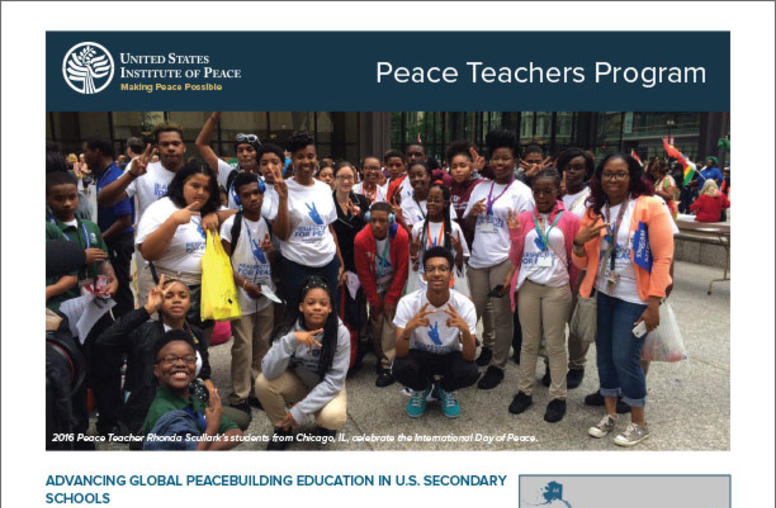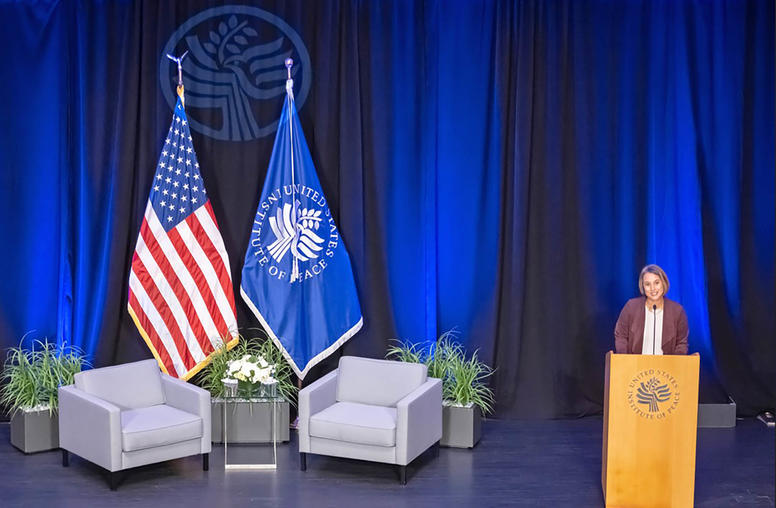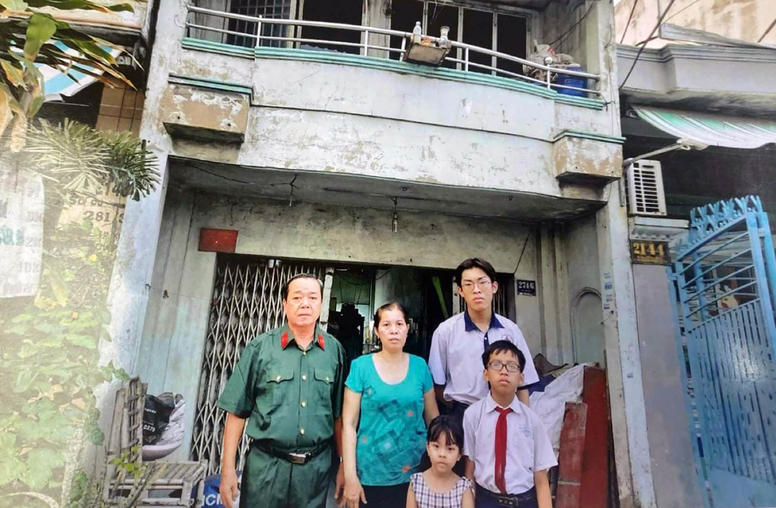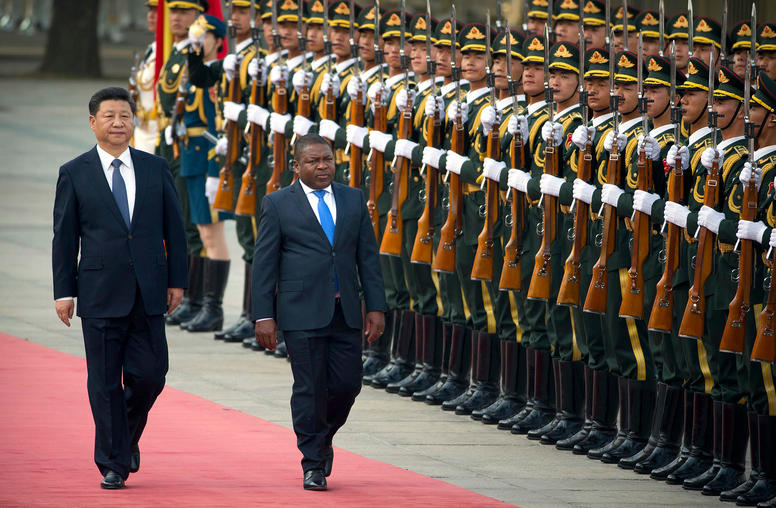Community Peacebuilders Graduate from School Partnering with USIP
The first class of students benefitting from a unique partnership between Future Generations Graduate School and the U.S. Institute of Peace (USIP) graduated at a ceremony in Washington, DC, on October 11, a milestone in USIP’s efforts to expand peacebuilding education to practitioners around the world.
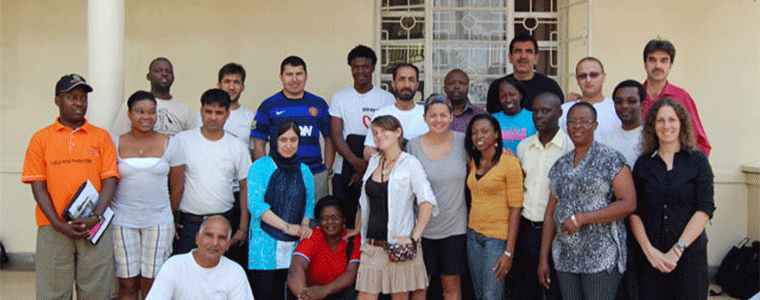
The collaboration between Future Generations and USIP blended direct instruction at four on-site residential sessions—the last one held in the United States after sessions in India, Kenya and Haiti—with online instruction and projects since its start in February 2012. Seventeen students from 12 countries were awarded a master’s degree in applied community change with a concentration in peacebuilding.
Future Generations Graduate School is an accredited higher-education program and is the educational arm of West Virginia-based Future Generations, an international civil society organization. Tuition for students in the class of 2013 was covered by the foundation created by the late philanthropist Kathryn Wasserman Davis.
The partnership has allowed USIP’s Academy for International Conflict Management and Peacebuilding to reach an underserved part of the peacebuilding community—community development practitioners—with education that they can put to use quickly. Throughout the program, students have continued to live in their home countries and carry on with their community development activities, generally for nongovernmental organizations or local government agencies.
“This is an important partnership for the Institute. It allows us to support people already working in their communities with new tools and approaches for preventing and reducing conflict,” said Lauren Van Metre, the Academy’s dean of students. Added Van Metre, who taught an introductory course on peacebuilding, “This is an extraordinary group of people, and it’s been a great experience to give them a space in which to learn and experiment.”
Another USIP instructor, Alison Milofsky, a senior program officer who taught inter-group dialogue, said “These people have an intrinsic motivation to learn peacebuilding skills. They get it.” During a residential program in Kenya, Milofsky assigned students the project of designing a dialogue process that could be applied in their home areas—work completed in their communities and online over the following two months. “They were really thinking through what it would mean in their communities,” she said.
The peacebuilding education could help the students’ development organizations to deliver assistance in ways that consciously seek to ease conflicts, or at least avoid aggravating them. And the hybrid combination of face-to-face, instructor-led teaching and online coursework, in partnership with another educational institution, could be a model for bringing USIP’s expertise into the field in new ways, Van Metre said.
The experience has also been useful in honing USIP’s approach to online learning; in the case of the Future Generations students, the online component was critical. “Using online technologies, the students could take courses while remaining in their communities, where they are doing great work,” said Dominic Kiraly, a senior program officer at the Academy who leads USIP’s distance-learning initiatives. “They stay connected with professors and fellow students, so the collaborative learning continues long after instructors meet with students.”
Kiraly, who also taught about civil resistance and citizen journalism, said USIP’s close work with students who lack reliable access to all of the communication technologies available in developed countries “has taught us how to be better designers of online courses, particularly for students with low bandwidth.” The online coursework was adapted over the course of the Future Generations program to meet the varying needs of students, some of whom have only sporadic Internet access at Internet cafés. Some participants need to download their coursework onto a memory stick. With technical challenges that prevented some students from downloading large files, the USIP content was organized into smaller files. In the future, Kiraly said, students will be able to access instructional materials flexibly with video, audio or transcribed versions.
The partnership with Future Generations is set to continue next year, with USIP instructors slated to participate in courses held in India and Uganda. “Our collaboration with USIP has been good for both sides,” said Future Generations Dean Mike Rechlin. “Our students gained access to the knowledge and skills of the top-flight faculty at the Academy.” Said Rechlin, “USIP brought experience from working overseas in a great many conflict zones. The way they taught was very practical and had hands-on exercises and role-playing.”
“The folks in our program are development practitioners,” said Rechlin. “They’re going to be working in communities that need healing.”
The students graduating say they are eager to use their new capabilities on the job. “The classes we had with USIP were very productive and useful,” said Maryam Safi, a 27-year-old Afghan who works with a nongovernmental group in Kabul. “I learned skills and knowledge—how to think and write and how to work for change.” Having fellow students from such countries as Nepal, Nigeria and Uganda also helped deepen her understanding of the cultural context in peace and conflict issues, she said. Safi said she has used dialogue-style discussions for Afghan youths, focusing on the basics of democracy and human rights.
Another graduate, Shondell France, 30, is from Georgetown, Guyana, and concentrates on youth issues, such as reducing illiteracy and countering violence. She works for the non-profit Agape Network, a community-based organization. Discussions about social change and non-violence in the Future Generations-USIP training—especially on the work of Mohandas Gandhi—have resonated among the youths she is helping. “Many of the kids said it impacted them in a deep way,” she said, and it could be helpful “in breaking out of the mold” of perceived powerlessness and violence. France said she will rely on some of the USIP instructional materials in her work.
Anthony Kadoma, 31, a Ugandan who works with the Organization for Rural Poverty Eradication, said the USIP training in dialogue was among the program’s most helpful aspects. “All of the work I do involves dialogue and working with people,” he said. The training will help Kadoma tackle community and family disputes, including domestic violence, he said. “I go to the root cause of the conflict…so I can help come up with a real solution,” he said. In the future, Kadoma said, his organization may try to help with national-level conflicts, including mediation in some of the problems that have arisen between Congolese refugees fleeing from insurgent fighting and Ugandans themselves.
